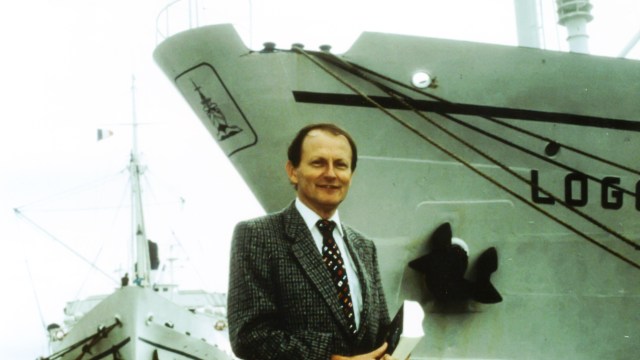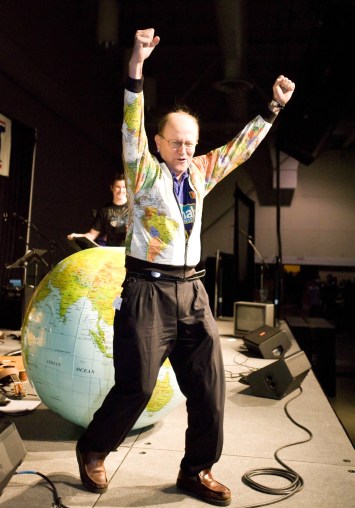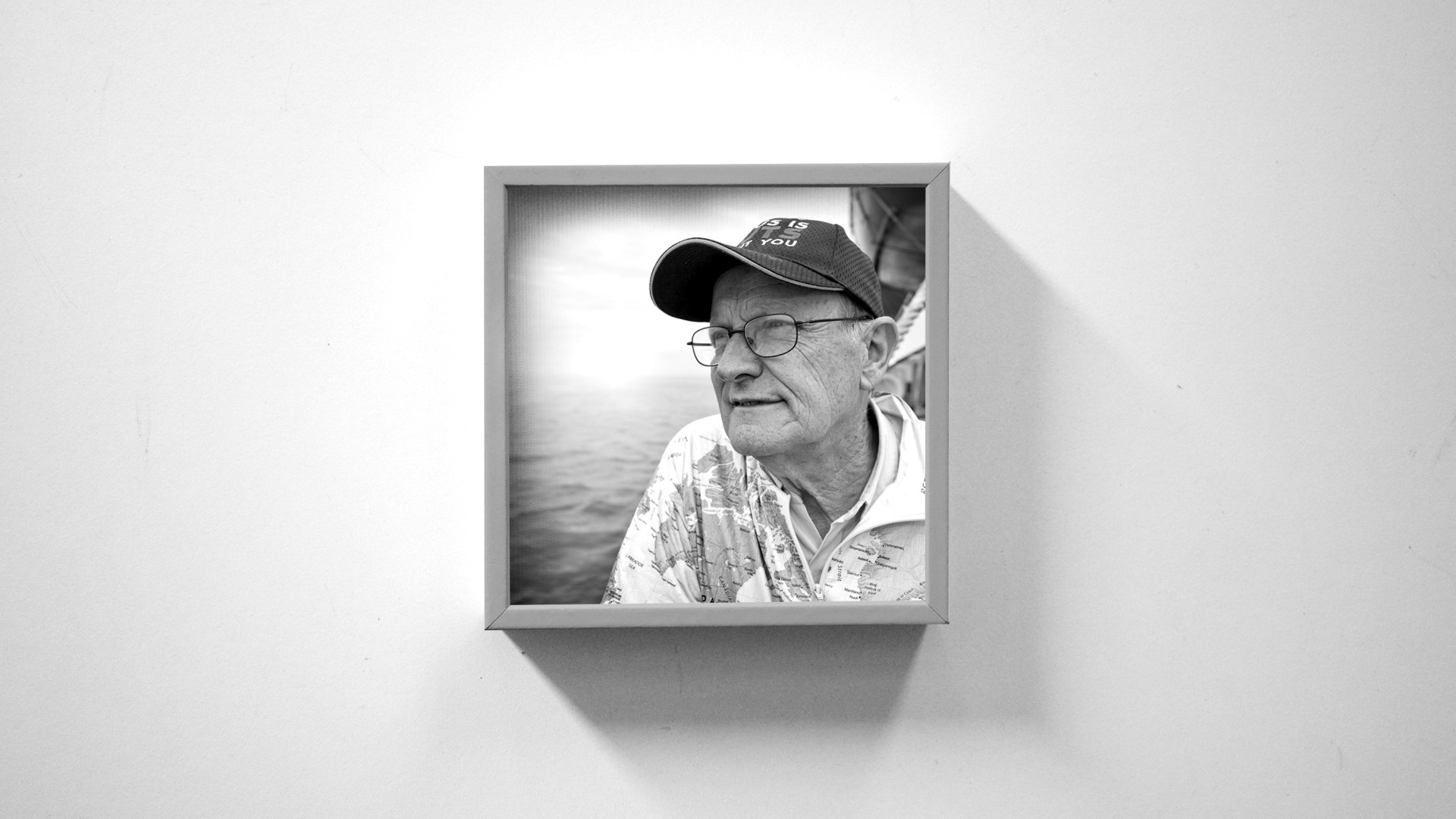George Verwer had a question.
When the 18-year-old and his friend finished praying in a dorm room in Maryville, Tennessee, Verwer looked at his college buddy and asked, “Well? Are you ready to go?”
Dale Rhoton was startled. He had only just heard Verwer’s idea that they should sell what they owned and use the money to buy a truck that summer, fill it with Spanish-language editions of the Gospel of John, and drive it to Mexico, where 70 percent of people didn’t have access to Scriptures. They had only just prayed about it.
“George,” he said, “it takes longer than that.”
Verwer didn’t see why it should. The future founder of Operation Mobilisation (OM) saw a spiritual need. They could meet that need. The rest didn’t matter to him.
“His one all-consuming passion in life has been to be a channel, whereby people would become long-term friends of Jesus,” Rhoton later wrote. “His comfort zone is breaking out of his comfort zone. He only really feels secure when he’s risking it all.”
That lifelong “Verwer fervor” for missions moved untold numbers of Christians to cross borders, cultures, and continents to proclaim the good news of God’s love. OM became one of the largest mission organizations of the 20th century, sending out thousands every year on short- and long-term trips. OM currently has 3,300 adult workers from 134 countries working in 147 countries. An estimated 300 other mission agencies were also started as a result of contact with OM or launched by former OMers.
Verwer died Friday at the age of 84.
Lindsay Brown, long-time leader the International Fellowship of Evangelical Students, remembered him as an outstanding missionary leader.
“In terms of the sheer range of activities and the agencies and leaders it has spawned, I think OM is unparalleled,” he said. “And I think George is the preeminent North American missionary statesman of the last 60 years. He has had a remarkable ministry.”
Verwer was born July 3, 1938, to Eleanor Caddell Verwer and George Verwer Sr., a Dutch immigrant who worked as an electrician. He was raised in Wyckoff, New Jersey, outside New York City. The family belonged to a Reformed Church in America congregation, but the elder George Verwer rarely attended, and to the younger, church seemed mostly like a social club.
Young Verwer was an athlete and a Boy Scout but spent a lot of time chasing girls and getting into trouble. Most of it was considered “shenanigans” by the standards of the day, but Verwer also started a fire in some woods in Bergen County and, as a young teen, broke into someone’s home and was caught by police.
News of the incident prompted a local Christian woman named Dorothea Clapp to start praying for Verwer, that he would find faith in Jesus. As he later described it, she put him on her “Holy Spirit hit list.”
Clapp also mailed Verwer a Gospel of John. The book did not immediately make an impact, but three years later, he felt compelled to attend a Billy Graham crusade in Madison Square Garden. He and a few friends took the bus 30 miles to hear Graham preach on March 5, 1955. At the invitation to commit his life to Christ, Verwer went forward. He was moved, he said, by the message that God loved him and could use him.
“I found that he could use me, not by crushing my temperament, or showing me up for the wretch I was,” Verwer later wrote, “but rather offering me love and working through the Holy Spirit.”
Back in New Jersey, he immediately went to work telling others about Jesus. He distributed 1,000 copies of John at his high school and organized a gospel crusade. More than 100 people came forward to commit their lives to Christ, according to local newspaper reports at the time, including one Verwer cared about a lot: his own father.
The young Verwer didn’t appreciate it at the time, but it was clear he had a gift for organizing—mobilizing—Christians. He got five high school students to share their testimonies and preach at his evangelistic event. He also got more than 30 teenagers at his mainline Dutch Reformed church to participate in a Bible-reading marathon, despite the skepticism of the pastor who told a reporter he was initially concerned the young people would not read with the proper decorum.
A few years later, at college, Verwer didn’t just sell his stuff and fund a mission trip to Mexico. He convinced two friends, Rhoton and Walter Borchard, to do the same thing.
Verwer, of course, didn’t really know what he was doing, handing out tracts and Scripture and trying to set up a Bible correspondence school in Monterrey. He made, as he later recalled, some “pretty heavy blunders.” He decided he needed more education and transferred to Moody Bible Institute in Chicago. There, when he thought about giving up on missions altogether, he heard evangelical minister Oswald J. Smith speak at chapel. Smith emphasized the importance of being where God wants you to be and dedicating yourself fully to Christ.
Verwer was convicted. He ran down the aisle—“just one, sort of, nut case”—and repented of his lack of love.
“God broke my heart,” he said. “I saw things in my heart were not right, and I knew I had to respond. … I must be willing to take risks for the kingdom.”
Later, when he was urging young people to go abroad for a summer or a few years, he would emphasize his reluctance and God’s persistence to make audiences laugh.
“God saw me,” he would say. “One stubborn Dutchman. And gave me a missionary kick. I’ve been in orbit ever since.”

Verwer organized a second trip to Mexico in 1958, and when he met and married his wife, Drena Knecht, in 1960, their “honeymoon” was also a missionary trip to Mexico. The newly married couple were so committed to their gospel adventure that Verwer tried to save money for the mission field by bartering their wedding cake for a tank of gas on the drive south. The first gas station attendant declined and gave them their fuel for free. The second agreed to the exchange.
The Verwers spent six months in Mexico and then moved to Spain, which was then controlled by the fascist dictator Francisco Franco, who had kicked out Protestant pastors, banned all public worship activity and announcements, and seized Protestant Bibles. Verwer got into trouble, though, when he took a trip to another totalitarian regime, driving to the Soviet Union with a car full of Bibles to distribute. He was stopped by authorities and ejected from the country.
As Verwer was deported to Austria, praying about what he should do next, he was struck by the thought that he wasn’t a very good missionary but was good at mobilizing others. He watched a bus of European tourists load up for the USSR and had the idea that that’s what he should be doing: sending others.
The next year, the ministry, then called Send the Light, organized around 2,000 short-term mission trips into Communist-controlled countries. They expanded to Muslim countries in 1963 and then started mobilizing missionaries to India.
Peter Dance, one of the young people from England who drove a truck full of gospel literature into Eastern Europe and India, recalled that it was scary and exhilarating.
“I had the feeling of There is no one there to help me anymore except Jesus,” he said. “Before I crossed that border, I had everything I needed; even my mother was there if I needed her. I went to India many times, and through breakdowns and difficulties, the Lord always came through.”
Christianity Today described those first recruits as “countercultural young people who were open to adventure”—“gospel pilgrims” who were “inclusive, evangelistic, and itinerant.”
Twenty five of them wrote a manifesto that Verwer published and distributed to churches, youth groups, and Christian bookstores throughout the US and Europe.
“The Lord Jesus Christ was a revolutionary!” it said. “And we are revolutionaries! … Within the sphere of absolute, literal obedience to his commands lies the power that will evangelize the world.”
Verwer combined the call for total and radical commitment to Christ with the idea of a short-term mission, lowering the expectations of service and making it easier for people to get started. He believed God would use those who were willing—even if they weren’t ready to make years-long commitments, hadn’t attended Bible college, or had messed up their lives. God, after all, redeemed messes. God works not just despite human mistakes but in them and through them.
Always critical of missions “experts” with well-developed theories and methods, Verwer would eventually call his approach “messiology.” Christians should always try to avoid making messes, and some mistakes could be spiritually devastating. But, he said, those who put their faith in Jesus shouldn’t forget that God saves sinners.
“I meet people for whom, humanly speaking, life has not worked out well,” he wrote. “They are not on Plan A or Plan B, but more like Plan M. When I speak with them, I remind them of the big alphabet and urge them to embrace radical grace and press on.”
He argued, too, that there was no one right way to proclaim the gospel. Missions-minded Christians needed to experiment, contextualize, and continually reevaluate what worked.
“Don’t we have 2,000 years of proof that God works in a variety of ways?” he wrote. “Can’t we accept that God works in different ways among different groups of people? The work of God is larger than any fellowship or organization.”
Verwer was sometimes forced to experiment and change OM’s model rapidly. In 1968, when he was forced out of India, OM decided to turn leadership over to Indians and set up Operation Mobilisation India as a distinct organization, which went on to plant thousands of churches.
Other times, Verwer took leaps of faith that didn’t seem necessary at all. In 1970, the missions organization purchased a ship. The official OM history notes that the idea of buying a ship was “outlandish” and no one in the organization had any idea how to make that purchase—much less sail a vessel to ports around the world, where they could give away Christian books and tell people about Jesus.
“Some thought I had lost my marbles!” Verwer later recalled.
But OM purchased a Dutch ship named Umanak, rechristened it Logos, and ultimately sailed it 230,000 nautical miles, to 250 different ports, ministering to 6.5 million people. The ministry added a second ship in 1977.
This “rough and ready” approach to ministry did not always work out. The Logos was shipwrecked in 1988 with $125,000 worth of Christian books. More upsetting to Verwer, multiple OM missionaries were hurt or killed in car accidents around the world. Sometimes they got in trouble with local authorities. And some of Verwer’s ideas were bad.
“I’ve got too many ideas—my creative juices are overflowing,” he told a group of Moody students. “Our vision in Christian ministry gets mingled with ego. … I will tell you I got in some embarrassing situations.”
Verwer also struggled with sin and doubt. He called himself a “natural backslider.” But in the end his love for Jesus and his passion for telling people around the globe about God’s love for them overcame everything else. One of his assistants, who went on to become a Chicago pastor, said Verwer embodied the kind of divine love described in John 3:16.

“I don’t know that there’s anybody who loves the whole world as much as George does—as far as humans are concerned—and has a desire for them to come into relationship with Jesus,” Mark Soderquist said.
Verwer, for his part, thought the most important part of the Christian life was love.
“There is no more biblical teaching than love, and apart from love there is no biblical teaching,” he wrote. “You are not orthodox if you are not humble. You are not ‘Bible-believing’ if you do not love.”
Verwer stepped down as international director of OM in 2003, turning leadership over to Peter Maiden. He continued, however, to speak to groups of young Christians around the world. He would bring out a giant inflatable globe, put on his trademark globe jacket, and ask them, again and again, a version of the question he asked his college friend when he was just 18.
“Well? Are you ready to go?”
“If you spend two years overseas,” Verwer said, “there’s a high chance you’re never going to be the same once you come back. You’ll have seen how God answers prayer and how the Holy Spirit changes lives, and you’ll have caught a glimpse of what God is doing around the world.”
Verwer is survived by his wife, Drena, and their three children, Ben, Daniel, and Christa.












